unit 3 celebration语法突破
文档属性
| 名称 | unit 3 celebration语法突破 |
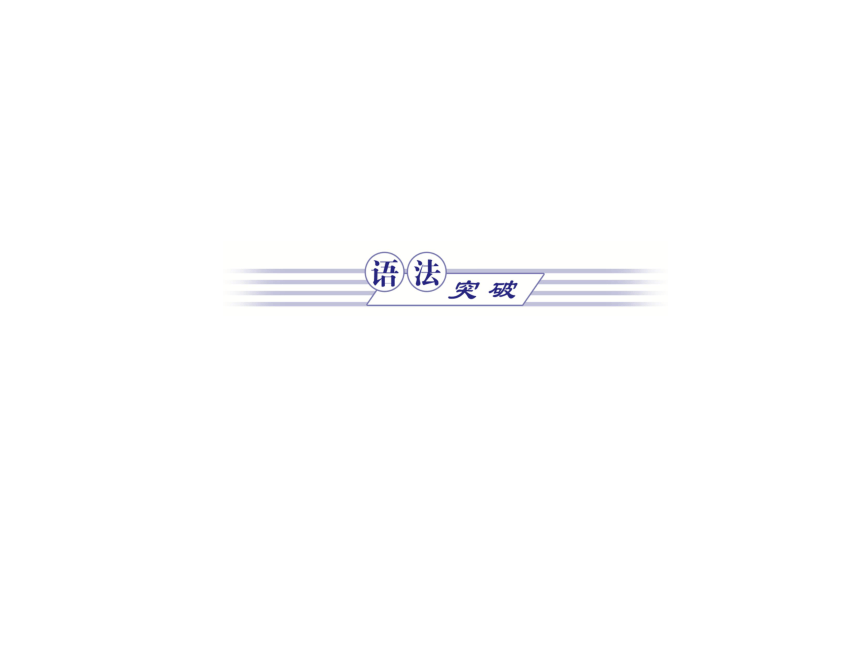
|
|
| 格式 | rar | ||
| 文件大小 | 177.8KB | ||
| 资源类型 | 教案 | ||
| 版本资源 | 北师大版 | ||
| 科目 | 英语 | ||
| 更新时间 | 2010-10-27 00:00:00 | ||
图片预览

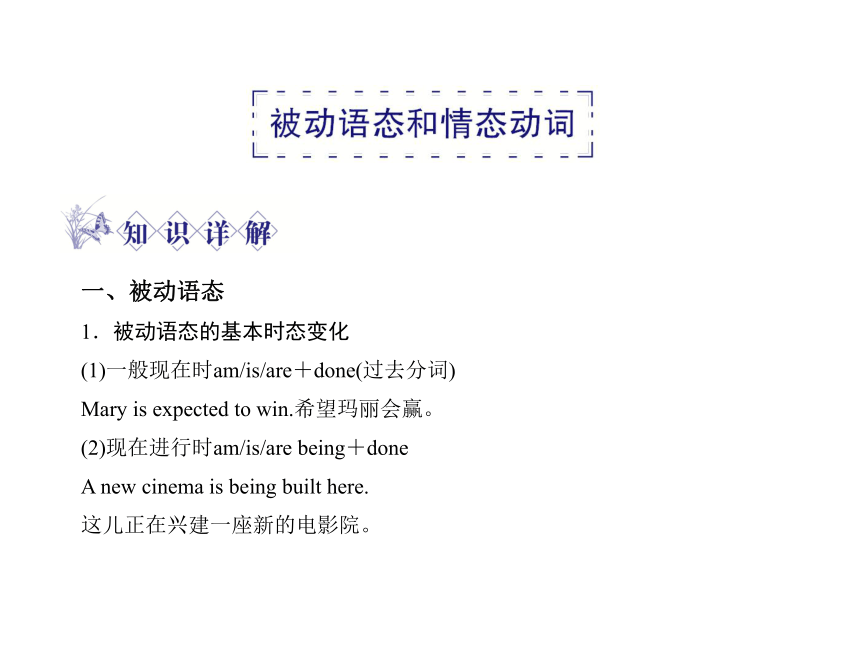
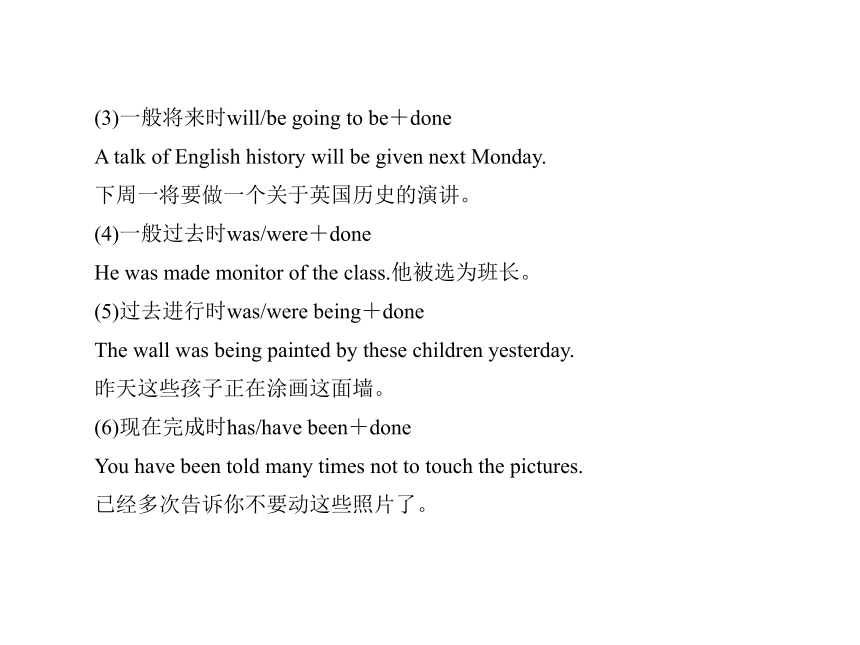
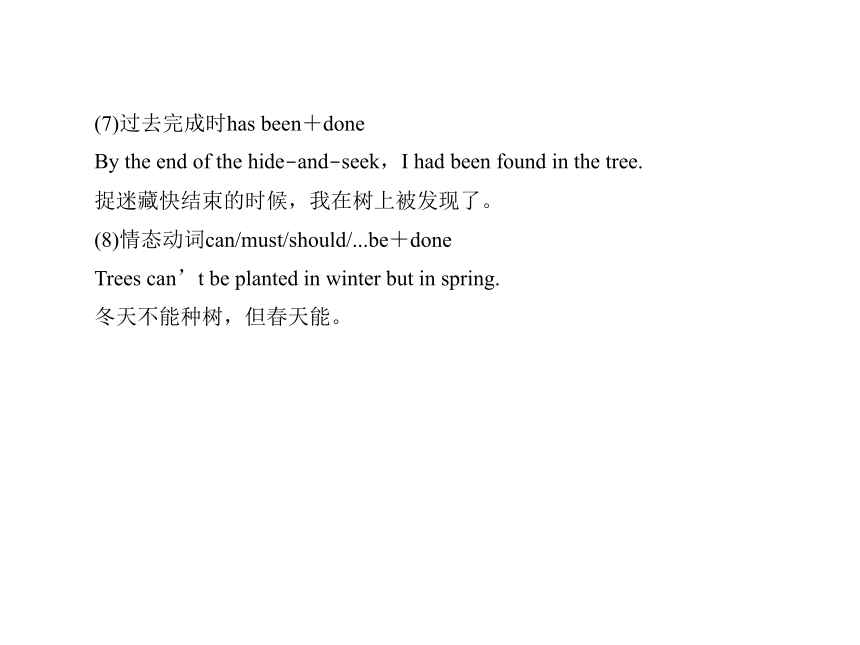
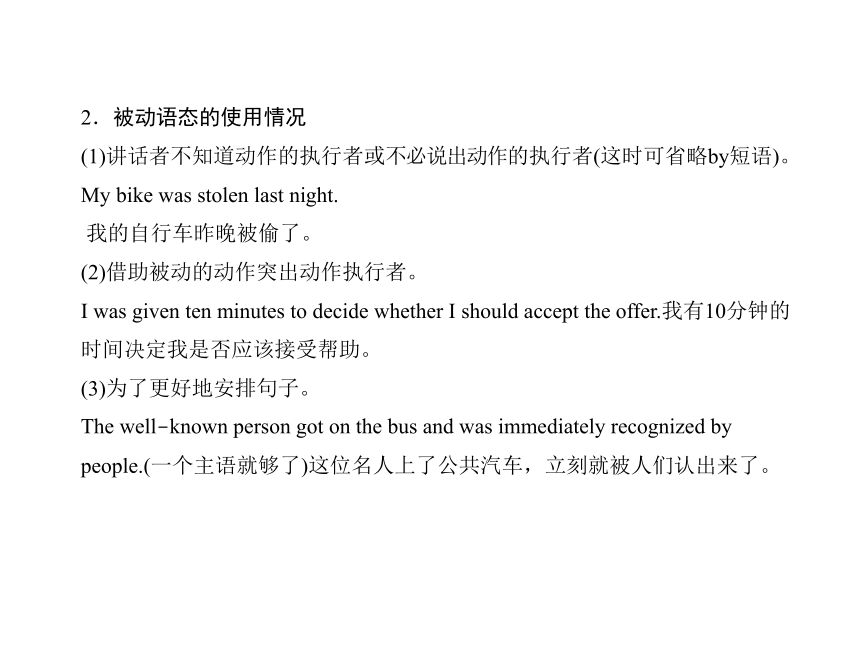
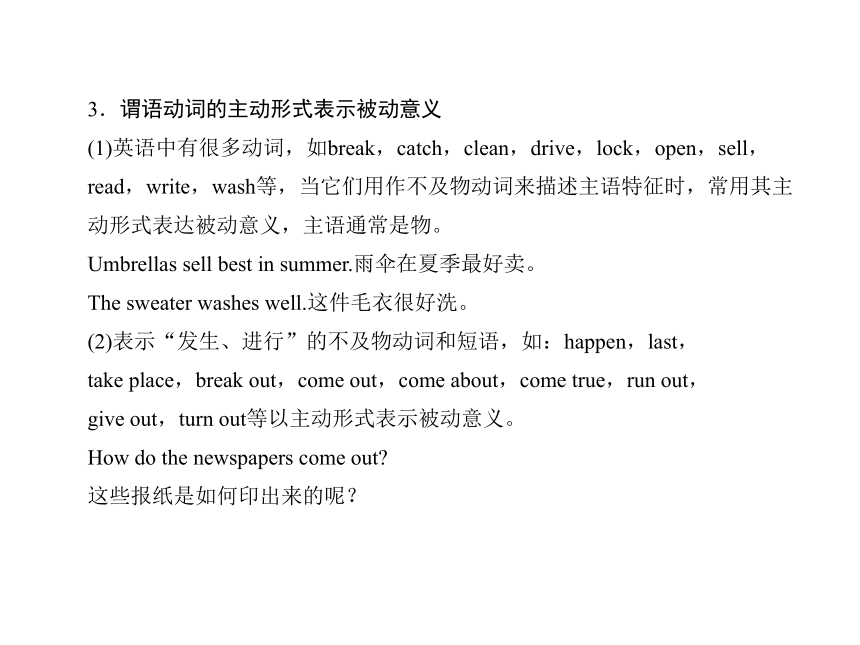
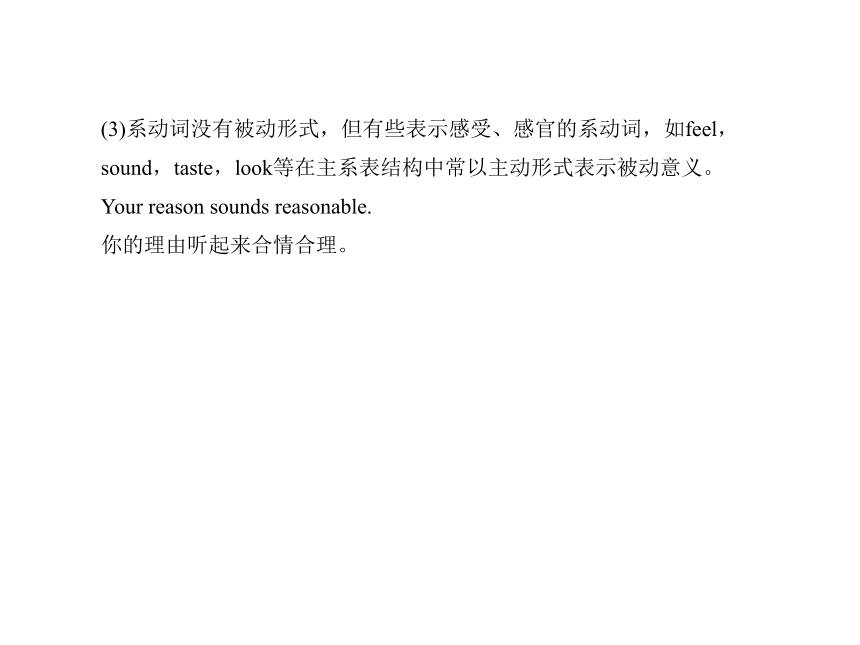
文档简介
课件18张PPT。一、被动语态
1.被动语态的基本时态变化
(1)一般现在时am/is/are+done(过去分词)
Mary is expected to win.希望玛丽会赢。
(2)现在进行时am/is/are being+done
A new cinema is being built here.
这儿正在兴建一座新的电影院。(3)一般将来时will/be going to be+done
A talk of English history will be given next Monday.
下周一将要做一个关于英国历史的演讲。
(4)一般过去时was/were+done
He was made monitor of the class.他被选为班长。
(5)过去进行时was/were being+done
The wall was being painted by these children yesterday.
昨天这些孩子正在涂画这面墙。
(6)现在完成时has/have been+done
You have been told many times not to touch the pictures.
已经多次告诉你不要动这些照片了。(7)过去完成时has been+done
By the end of the hide-and-seek,I had been found in the tree.
捉迷藏快结束的时候,我在树上被发现了。
(8)情态动词can/must/should/...be+done
Trees can’t be planted in winter but in spring.
冬天不能种树,但春天能。2.被动语态的使用情况
(1)讲话者不知道动作的执行者或不必说出动作的执行者(这时可省略by短语)。
My bike was stolen last night.
我的自行车昨晚被偷了。
(2)借助被动的动作突出动作执行者。
I was given ten minutes to decide whether I should accept the offer.我有10分钟的
时间决定我是否应该接受帮助。
(3)为了更好地安排句子。
The well-known person got on the bus and was immediately recognized by
people.(一个主语就够了)这位名人上了公共汽车,立刻就被人们认出来了。3.谓语动词的主动形式表示被动意义
(1)英语中有很多动词,如break,catch,clean,drive,lock,open,sell,
read,write,wash等,当它们用作不及物动词来描述主语特征时,常用其主
动形式表达被动意义,主语通常是物。
Umbrellas sell best in summer.雨伞在夏季最好卖。
The sweater washes well.这件毛衣很好洗。
(2)表示“发生、进行”的不及物动词和短语,如:happen,last,
take place,break out,come out,come about,come true,run out,
give out,turn out等以主动形式表示被动意义。
How do the newspapers come out?
这些报纸是如何印出来的呢?(3)系动词没有被动形式,但有些表示感受、感官的系动词,如feel,
sound,taste,look等在主系表结构中常以主动形式表示被动意义。
Your reason sounds reasonable.
你的理由听起来合情合理。二、情态动词
情态动词有一定的词义,表示说话人的某种语气或感情,即说话人对动作
的观点,如需要、可能、意愿、许可或怀疑等。情态动词要与行为动词或
连系动词一起构成谓语,没有人称和数的变化。
1.can
(1)表示能力,相当于be able to。
He can speak English and French.他会说英语和法语。
(2)表示允许。和may意思相近,口语中多用could。
You can say that again.你可以再说一遍。
(3)表示惊异、怀疑、不相信、失望等态度,主要用于否定句、疑问句或感
叹句中。
What can he mean?他是什么意思呢?
He can’t be over forty.他不可能有40多岁。2.have to
have to的含义与must相似,两者往往可以互换使用,但have to有各种形式,
随have的变化而定。must与have to有下列几点不同:
(1)must表示的是说话人的主观看法,而have to则往往强调客观需要。
The play is not interesting;I really must go now.
I had to work when I was your age.
(2)must一般只表现在时态,have to则有更多的时态形式。
(3)二者的否定意义大不相同。
You mustn’t go.你可不要去。
You don’t have to go.你不必去。
(4)询问对方的意愿时应用must。
—Must I clean all the room?我必须打扫房间吗?
—No,you don’t have to.不用,没有这个必要。3.ought to
情态动词ought to只有一种形式,否定式为ought not to。其基本用法如下:
(1)表示义务和责任,比should语气要强。
You ought to listen to your parents.
你应该听从父母的话。
He ought not to drink too much.他不应该喝太多酒。
(2)表示推测,暗含很大的可能性,比must语气弱。
He ought to be here soon.他可能很快就到这儿来。
There oughtn’t to be any trouble.
不会有什么麻烦。(3)ought to+动词完成式,在肯定句中表示应该做而未做之事,在否定句中
表示做了不该做的事。
You ought to have seen that movie.
你早该去看那部电影。
I oughtn’t to have been there with her.
我本不该跟她去那儿。1.—Who________it be that will win the match?
—It________be the Bull’s.
A.can;may B.may;must
C.might;can D.can;can
【答案】 A
2.—Why should you do that kind of job?
—I________,because there is no other job I can do.
A.must B.must to
C.have D.have to
【答案】 D3.She ________ f or what she has done,I think.
A.ought to praise B.ought to be praised
C.ought have her praised D.ought have been praised
【答案】 B
4.He ought ________ have done so even though possible.
A.not to B.to not
C.not D .never
【解析】 ought to的否定式为ought not to或oughtn’t to。
【答案】 A5.There’s no light on—they ________ be at home.
A.can’t B.mustn’t
C.needn’t D.shouldn’t
【解析】 句意为:没有亮灯——他们肯定没有在家。在英国英语中,
mustn’t不用来表示“肯定不;不可能”。needn’t不用来表推测;
shouldn’t的语气较can’t弱。
【答案】 A
6.At the end of the meeting,it was announced that an agreement________.
A.has been reached B.had been reached
C.has reached D.had reached
【解析】 句意为:会议结束的时候宣布与会各方已经达成一致。
agreement是被达成的,因此使用被动语态。应为从句动作发生在主句动作
之前,因此从句应使用过去完成时的被动语态。
【答案】 B7.—Have you handed in your schoolwork yet?
—Yes,I have;I guess it________now.
A.has graded B.is graded
C.is being graded D.is grading
【解析】 句意为:“你已经交上作业了吗?”“是的,已经交了。我想
它现在正在被评分。”由I guess和now 可知,此处指目前正在进行的动作,
应用现在进行时,而schoolwork与grade之间为逻辑上的被动关系,应用被动
语态。故须用现在进行时的被动语态。
【答案】 C8.Some aspects of a pilot’s job________be boring,and pilots
often________work at inconvenient hours.
A.can;have to B.may;can
C.have to;may D.ought to;must
【解析】 句意为:飞行员工作有些方面可能是乏味的,他们必须经常在不
方便的时段里工作。can可用来表示“理论上的可能性”,意为“可能,有
时会”,have to 表示在客观条件下的“不得不”。may多用来表示“实际上
的可能性”,must表示主观上的“必须”。
【答案】 A9.—Your job ________ open for your return.
—Thanks.
A.will be kept B.will keep
C.had kept D.had been kept
【解析】 句意为:“你的工作会给你留着,等你回来。”“谢谢。”因句
中需用被动意义,故B、C不对,再从语境看出,此处的时态或者用一般将
来时,或者用现在完成时,故D项的过去完成时不符合语境意义。
【答案】 A10.Energy drinks are not allowed ________ in Australia but are brought in
from New Zealand.
A.to make B.to be made
C.to have been made D.to be making
【解析】 句意为:能量饮料不允许在澳大利亚制造但是可以从新西兰引
进。be allowed to do 意为“被允许做某事”,drinks与make之间存在动宾关
系,且没有完成时和进行时的意味,故选B。
【答案】 B
1.被动语态的基本时态变化
(1)一般现在时am/is/are+done(过去分词)
Mary is expected to win.希望玛丽会赢。
(2)现在进行时am/is/are being+done
A new cinema is being built here.
这儿正在兴建一座新的电影院。(3)一般将来时will/be going to be+done
A talk of English history will be given next Monday.
下周一将要做一个关于英国历史的演讲。
(4)一般过去时was/were+done
He was made monitor of the class.他被选为班长。
(5)过去进行时was/were being+done
The wall was being painted by these children yesterday.
昨天这些孩子正在涂画这面墙。
(6)现在完成时has/have been+done
You have been told many times not to touch the pictures.
已经多次告诉你不要动这些照片了。(7)过去完成时has been+done
By the end of the hide-and-seek,I had been found in the tree.
捉迷藏快结束的时候,我在树上被发现了。
(8)情态动词can/must/should/...be+done
Trees can’t be planted in winter but in spring.
冬天不能种树,但春天能。2.被动语态的使用情况
(1)讲话者不知道动作的执行者或不必说出动作的执行者(这时可省略by短语)。
My bike was stolen last night.
我的自行车昨晚被偷了。
(2)借助被动的动作突出动作执行者。
I was given ten minutes to decide whether I should accept the offer.我有10分钟的
时间决定我是否应该接受帮助。
(3)为了更好地安排句子。
The well-known person got on the bus and was immediately recognized by
people.(一个主语就够了)这位名人上了公共汽车,立刻就被人们认出来了。3.谓语动词的主动形式表示被动意义
(1)英语中有很多动词,如break,catch,clean,drive,lock,open,sell,
read,write,wash等,当它们用作不及物动词来描述主语特征时,常用其主
动形式表达被动意义,主语通常是物。
Umbrellas sell best in summer.雨伞在夏季最好卖。
The sweater washes well.这件毛衣很好洗。
(2)表示“发生、进行”的不及物动词和短语,如:happen,last,
take place,break out,come out,come about,come true,run out,
give out,turn out等以主动形式表示被动意义。
How do the newspapers come out?
这些报纸是如何印出来的呢?(3)系动词没有被动形式,但有些表示感受、感官的系动词,如feel,
sound,taste,look等在主系表结构中常以主动形式表示被动意义。
Your reason sounds reasonable.
你的理由听起来合情合理。二、情态动词
情态动词有一定的词义,表示说话人的某种语气或感情,即说话人对动作
的观点,如需要、可能、意愿、许可或怀疑等。情态动词要与行为动词或
连系动词一起构成谓语,没有人称和数的变化。
1.can
(1)表示能力,相当于be able to。
He can speak English and French.他会说英语和法语。
(2)表示允许。和may意思相近,口语中多用could。
You can say that again.你可以再说一遍。
(3)表示惊异、怀疑、不相信、失望等态度,主要用于否定句、疑问句或感
叹句中。
What can he mean?他是什么意思呢?
He can’t be over forty.他不可能有40多岁。2.have to
have to的含义与must相似,两者往往可以互换使用,但have to有各种形式,
随have的变化而定。must与have to有下列几点不同:
(1)must表示的是说话人的主观看法,而have to则往往强调客观需要。
The play is not interesting;I really must go now.
I had to work when I was your age.
(2)must一般只表现在时态,have to则有更多的时态形式。
(3)二者的否定意义大不相同。
You mustn’t go.你可不要去。
You don’t have to go.你不必去。
(4)询问对方的意愿时应用must。
—Must I clean all the room?我必须打扫房间吗?
—No,you don’t have to.不用,没有这个必要。3.ought to
情态动词ought to只有一种形式,否定式为ought not to。其基本用法如下:
(1)表示义务和责任,比should语气要强。
You ought to listen to your parents.
你应该听从父母的话。
He ought not to drink too much.他不应该喝太多酒。
(2)表示推测,暗含很大的可能性,比must语气弱。
He ought to be here soon.他可能很快就到这儿来。
There oughtn’t to be any trouble.
不会有什么麻烦。(3)ought to+动词完成式,在肯定句中表示应该做而未做之事,在否定句中
表示做了不该做的事。
You ought to have seen that movie.
你早该去看那部电影。
I oughtn’t to have been there with her.
我本不该跟她去那儿。1.—Who________it be that will win the match?
—It________be the Bull’s.
A.can;may B.may;must
C.might;can D.can;can
【答案】 A
2.—Why should you do that kind of job?
—I________,because there is no other job I can do.
A.must B.must to
C.have D.have to
【答案】 D3.She ________ f or what she has done,I think.
A.ought to praise B.ought to be praised
C.ought have her praised D.ought have been praised
【答案】 B
4.He ought ________ have done so even though possible.
A.not to B.to not
C.not D .never
【解析】 ought to的否定式为ought not to或oughtn’t to。
【答案】 A5.There’s no light on—they ________ be at home.
A.can’t B.mustn’t
C.needn’t D.shouldn’t
【解析】 句意为:没有亮灯——他们肯定没有在家。在英国英语中,
mustn’t不用来表示“肯定不;不可能”。needn’t不用来表推测;
shouldn’t的语气较can’t弱。
【答案】 A
6.At the end of the meeting,it was announced that an agreement________.
A.has been reached B.had been reached
C.has reached D.had reached
【解析】 句意为:会议结束的时候宣布与会各方已经达成一致。
agreement是被达成的,因此使用被动语态。应为从句动作发生在主句动作
之前,因此从句应使用过去完成时的被动语态。
【答案】 B7.—Have you handed in your schoolwork yet?
—Yes,I have;I guess it________now.
A.has graded B.is graded
C.is being graded D.is grading
【解析】 句意为:“你已经交上作业了吗?”“是的,已经交了。我想
它现在正在被评分。”由I guess和now 可知,此处指目前正在进行的动作,
应用现在进行时,而schoolwork与grade之间为逻辑上的被动关系,应用被动
语态。故须用现在进行时的被动语态。
【答案】 C8.Some aspects of a pilot’s job________be boring,and pilots
often________work at inconvenient hours.
A.can;have to B.may;can
C.have to;may D.ought to;must
【解析】 句意为:飞行员工作有些方面可能是乏味的,他们必须经常在不
方便的时段里工作。can可用来表示“理论上的可能性”,意为“可能,有
时会”,have to 表示在客观条件下的“不得不”。may多用来表示“实际上
的可能性”,must表示主观上的“必须”。
【答案】 A9.—Your job ________ open for your return.
—Thanks.
A.will be kept B.will keep
C.had kept D.had been kept
【解析】 句意为:“你的工作会给你留着,等你回来。”“谢谢。”因句
中需用被动意义,故B、C不对,再从语境看出,此处的时态或者用一般将
来时,或者用现在完成时,故D项的过去完成时不符合语境意义。
【答案】 A10.Energy drinks are not allowed ________ in Australia but are brought in
from New Zealand.
A.to make B.to be made
C.to have been made D.to be making
【解析】 句意为:能量饮料不允许在澳大利亚制造但是可以从新西兰引
进。be allowed to do 意为“被允许做某事”,drinks与make之间存在动宾关
系,且没有完成时和进行时的意味,故选B。
【答案】 B
